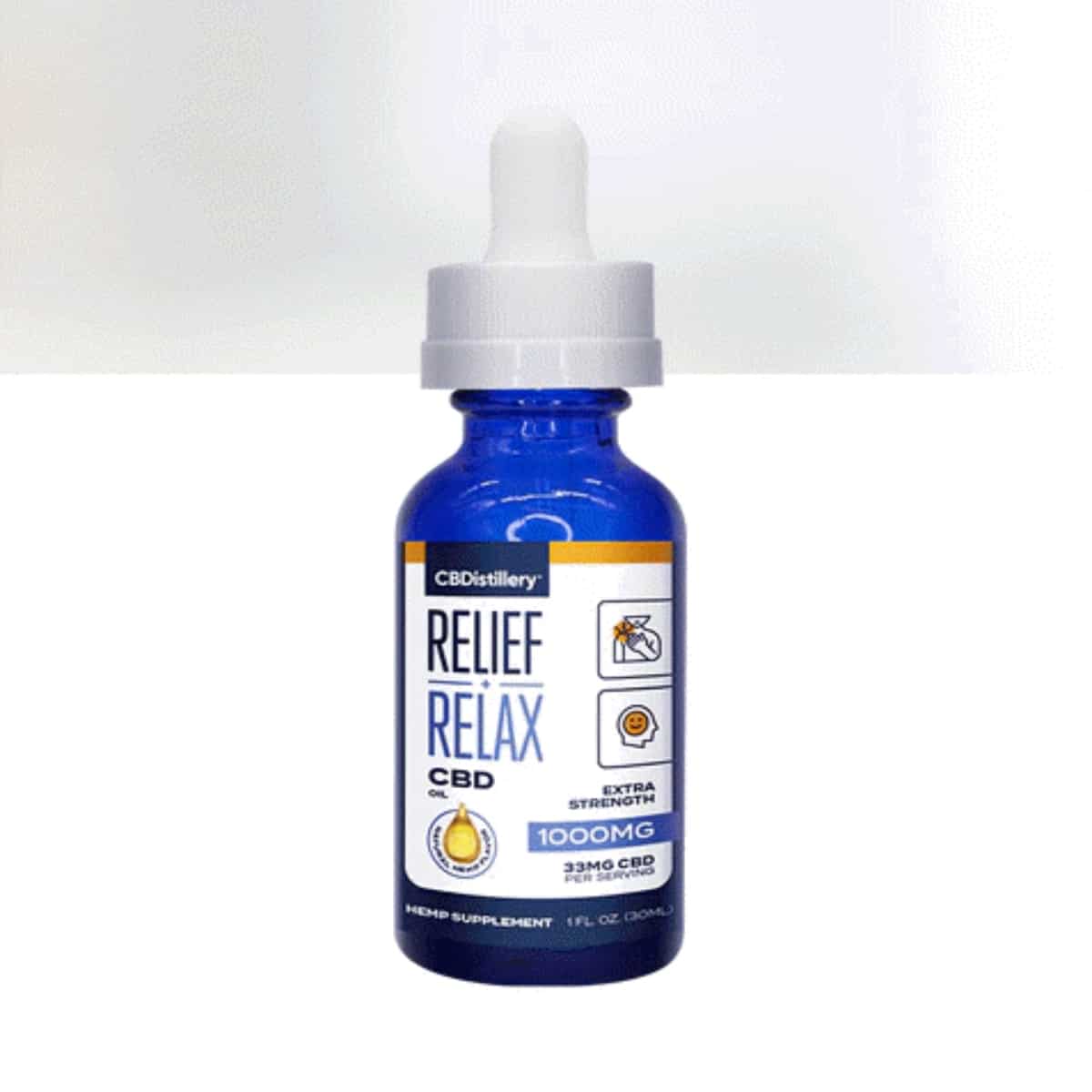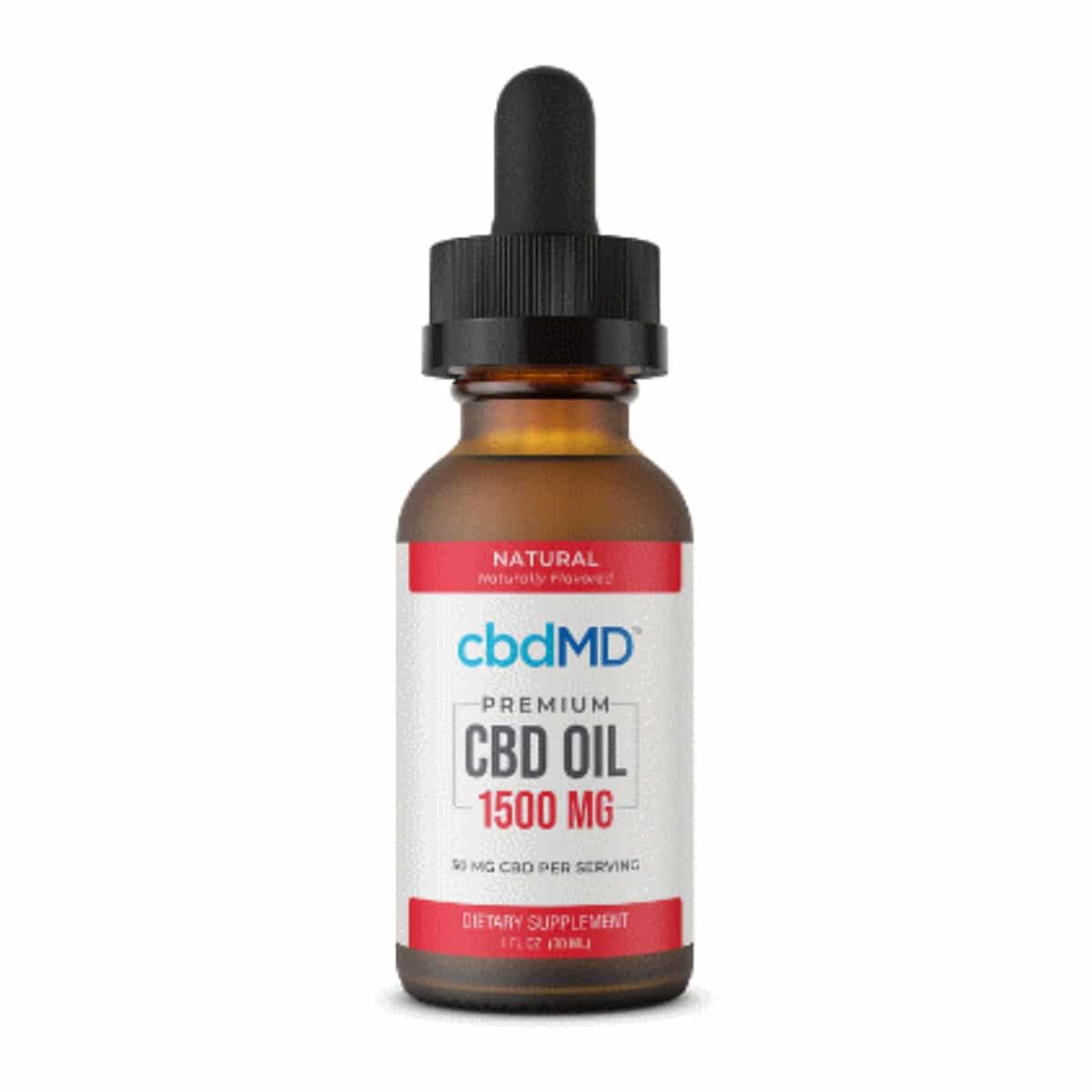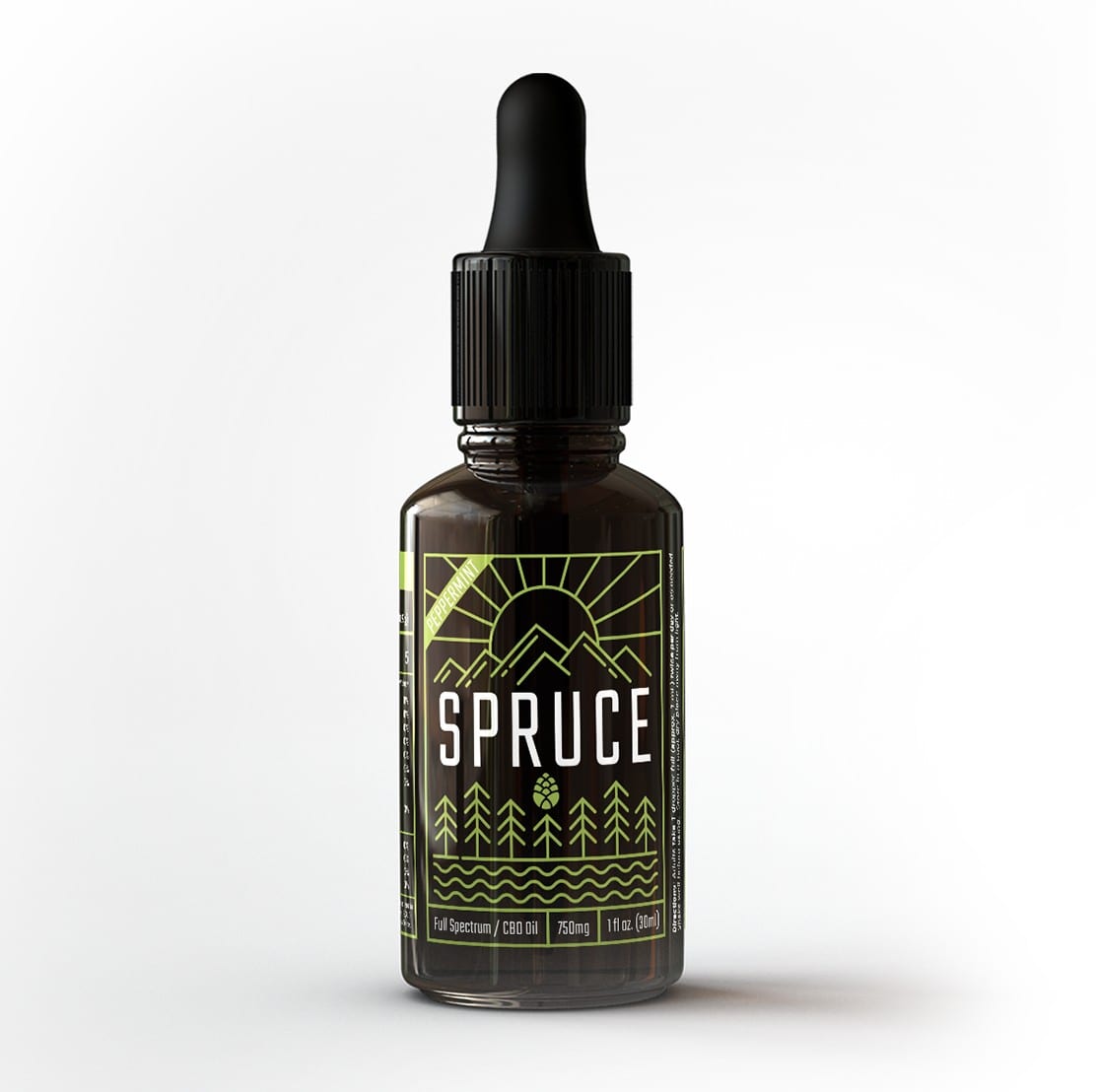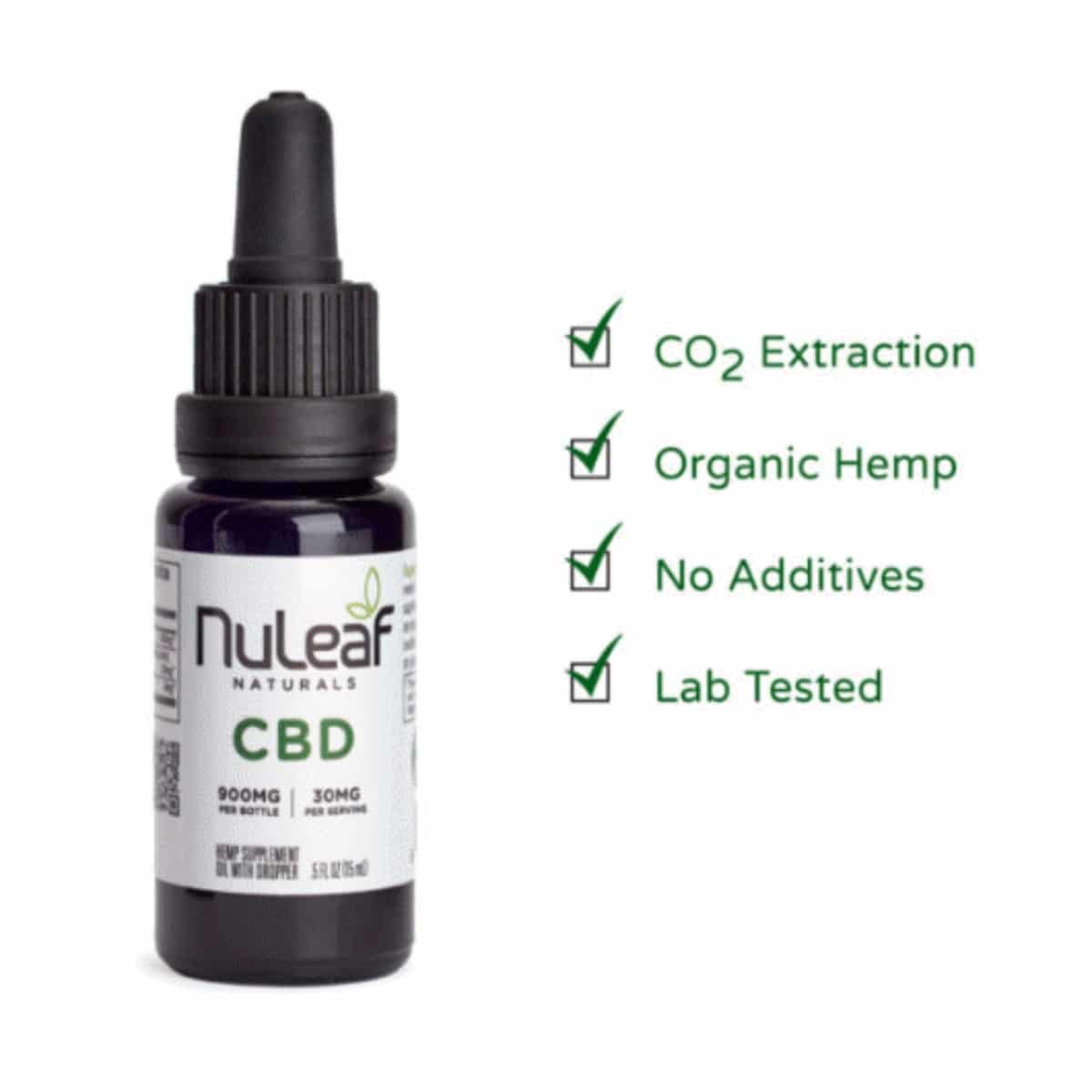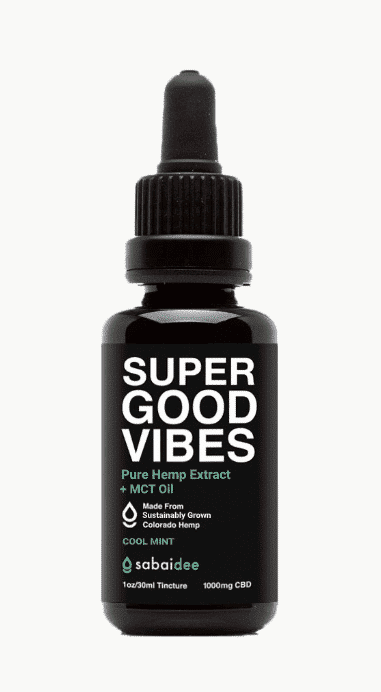
Can CBD Help With Digestion, and if So, How?
- The digestive system has three main functions: food digestion, nutrient absorption, and waste elimination. These functions involve the whole gastrointestinal tract (GI), from mouth to anus.
- Studies have shown that cannabidiol (CBD) might help relieve digestive issues and maintain gut health(1).
- CBD may help treat various digestive problems by working with the endocannabinoid system (ECS)(2).
- However, potential side effects of CBD include vomiting, nausea, drowsiness, and diarrhea(3).
- Consult a doctor before using CBD products as a treatment for medical conditions or using CBD oil for digestion.
Best CBD Oils for Digestion
CBDistillery Full Spectrum CBD Oil
Reap all of the benefits of cannabis plant without any potentially intoxicating effects.
-
Overall Clinical Score
99%Most Pure -
Score
breakdown
-
Summary
CBDistillery’s Full Spectrum Oil Tinctures combine the powers of CBD oil and other naturally occurring plant proteins, minerals, vitamins, and more so that you can get all of the benefits of the cannabis plant without any potentially intoxicating effects.
Pros
Cons
-
60-Day Satisfaction Guarantee
-
Various strengths
-
Oil extracted from aerial plant parts of US grown industrial hemp
-
Sourced from non-GMO industrial hemp grown in the USA through natural farming practices
-
Dropper is a bit shaky
-
-
Features
Discount pricing available? CBDCLINICALS15 Source Source of HempColorado, USA Form Oil Tincture Ingredients Fractionated Coconut Oil (MCT) and Full Spectrum CBD Hemp Extract (Aerial Parts) Type Type of CBDFull-spectrum Extraction Extraction MethodCO2 extraction How to take it Apply your desired dosage and hold under the tongue for 10-20 seconds before swallowing. Potency Potency - CBD Per Bottle500mg - 5000mg Carrier Oil Coconut Oil (MCT) Concentration CBD Concentration Per Serving16.6mg to 166.6mg Drug Test May contain trace amounts of hemp derived THC <0.3% Flavours None Price Range $35 - $240 $/mg CBD Price ($/mg)$0.04 - $0.07 Shipping Shipping/Time to deliveryStandard UPS Shipping, ships up to 5 business days Lab Tests Lab Testing TransparencyThird Party Lab Tested post formulation for safety and potency, available on website Contaminants Contaminant-free Allergens Allergen-free Recommended for Different CBD users with different needs
cbdMD CBD Oil Tincture Natural 1500mg
Uses USA hemp that is grown on non-GMO farms, and is both vegan and gluten-free
-
Overall Clinical Score
99%Best Natural Alternative -
Score
breakdown
-
Summary
cbdMD’s CBD oil tinctures are made using only CBD sourced from medical hemp and MCT oil as a carrier oil. Tinctures are offered in orange, mint, natural, and berry flavors. Safe for daily use, the oil tinctures are packaged with a built-in rubber dropper to adjust CBD dosage easily. The packaging is made to be easy to transport and discreet to use.
Pros
Cons
-
Various delicious flavors to choose from
-
Has vegan, organic, and gluten-free ingredients
-
Free shipping for this particular product within USA
-
World-class customer service team
-
cbdMD uses MCT as its carrier oil so individuals who are allergic with coconuts should consider other brand options
-
-
Features
Discount pricing available? 15% Off Coupon Code: cbdMD15 Source Source of HempKentucky, USA Form Oil Tincture Ingredients Cannabidiol (CBD), MCT Oil, and Flavoring Type Type of CBDBroad Spectrum Extraction Extraction MethodCO2 extraction method How to take it Under tongue Potency Potency - CBD Per Bottle1500mg per bottle Carrier Oil Organic Coconut MCT Oil Concentration CBD Concentration Per Serving50mg per dropper full (1ml) Drug Test Containing less than 0.3% THC, there are still trace amounts Flavours Natural, Berry, Orange and Mint Price Range $99.99 $/mg CBD Price ($/mg)$0.07 Shipping Shipping/Time to delivery2-5 Business days (via Fedex) Lab Tests Lab Testing TransparencyThird Party Lab Tested post formulation for safety and potency, available on website Contaminants 100% organic, non-GMO, and vegan-certified Allergens Vegan, Gluten free Refund policy Within 30 days Recommended for Daily CBD oil users Countries served USA only (all 50 states)
Spruce 750mg Lab Grade CBD Oil
Specifically formulated to be more palatable to CBD users
-
Overall Clinical Score
99%Editor's Pick -
Score
breakdown
-
Summary
Each bottle of the 750mg CBD oil tincture contains 25mg of CBD per dropper full. The oil is peppermint flavor to mask any unpleasant tastes related to CBD.
Pros
Cons
-
Mid-strength
-
Natural peppermint flavor
-
Made from 100% organic and natural ingredients
-
No other flavors
-
-
Features
Discount pricing available? 20% Off Coupon Code: CBDCLINICALS Source Source of HempKentucky, USA & North Carolina, USA Form Oil Tincture Ingredients Organic Hemp Seed Oil, Full Spectrum CBD Oil Type Type of CBDFull Spectrum Extraction Extraction MethodMoonshine extraction method How to take it Under tongue Potency Potency - CBD Per Bottle750 mg per bottle Carrier Oil Organic Hemp Seed Oil Concentration CBD Concentration Per Serving25mg of CBD per dropper full (1ml) Drug Test Contains 0.3% THC but there is a chance you may test positive for marijuana Flavours Peppermint Price Range $89 ($75.65 for subscriptions, 15% discount from regular price) $/mg CBD Price ($/mg)$0.12/mg ($0.10/mg with subscription) Shipping Shipping/Time to delivery2-4 business days (first class USPS) Lab Tests Lab Testing TransparencyThird Party Lab Tested post formulation for safety and potency, available on website Contaminants Organic, Non-GMO, no pesticides, no herbicides, no solvents or chemical fertilizers, No preservatives or sweeteners Allergens Vegan, Gluten free Refund policy Within 30 days Recommended for New CBD users Countries served USA only (all 50 states)
NuLeaf Naturals 900mg Full Spectrum Hemp CBD Oil
Perfect for anyone who are looking for CBD products that promote a healthy body and mind.
-
Overall Clinical Score
99%Best Organic -
Score
breakdown
-
Summary
Natural remedy for various illnesses. NuLeaf Naturals’ CBD oil is a whole-plant extract containing a full spectrum of naturally occurring synergistic cannabinoids and terpenes.
Pros
Cons
-
Pure CBD hemp
-
All natural
-
Approximately 300 drops total
-
No other flavors
-
-
Features
Discount pricing available? 20% Off Coupon Code: CBDCLINICALS20 Source Source of HempColorado, USA Form Oil Tincture Ingredients Full Spectrum Hemp Extract, Organic Virgin Hemp Seed Oil Type Type of CBDFull Spectrum CBD Extraction Extraction MethodCO2 Method How to take it Under the tongue for approximately 30 seconds before swallowing Potency Potency - CBD Per Bottle900mg per bottle Carrier Oil Organic Hemp Oil Concentration CBD Concentration Per Serving60mg per dropper full (1ml) Drug Test Contains 0.3% THC but there is a chance you may test positive for marijuana Flavours Natural Price Range $99 - $434 $/mg CBD Price ($/mg)$0.08 - $0.13 Shipping Shipping/Time to delivery2-3 Days via USPS Lab Tests Lab Testing TransparencyThird Party Lab Tested post formulation for safety and potency, available on website Contaminants No additives or preservatives, Non-GMO, NO herbicides, pesticides, or chemical fertilizers Allergens Not specified Refund policy Within 30 days Recommended for Health-conscious persons Countries served USA (all 50 states) and over 40 countries including Australia, Azerbaijan, Beliza, Bosnia & Herzegovina, Brazil, Chile, China, Croatia, Czech Republic, Estonia, France, Hong Kong, Hungary, Ireland, Israel, Japan, Latvia, Lebanon, Lithuania, Macao, Malaysia, Malta, Netherlands, New Zealand, Oman, Paraguay, Poland, Portugal, Saudi Arabia, Serbia, Singapore, South Korea, Sweden, Switzerland, United Arab Emirates, United Kingdom, Uruguay, and many more.
Sabaidee Super Good Vibes CBD Oil
4x the strength of a regular cbd oil
-
Overall Clinical Score
99%Best Value -
Score
breakdown
-
Summary
Super Good Vibes CBD Oil provides the purest and highest quality Cannabidiol (CBD) on the market as well as other high quality phytocannabinoids, terpenes, vitamins, omega fatty acids, trace minerals, and other beneficial for your health elements, which all work together to provide benefits.
Pros
Cons
-
Extra strong
-
Significant benefits with just a few drops
-
100% Natural ingredients
-
No other flavors
-
-
Features
Discount pricing available? 15% Off Coupon Code: CBDCLINICALS15 Source Source of HempColorado, USA Form Oil Tincture Ingredients Cannabidiol (CBD), Coconut Medium-chain triglycerides (MCT) Oil, Peppermint oil Type Type of CBDBroad Spectrum Extraction Extraction MethodCO2-extraction How to take it Using 1-3 servings per day as needed is a good start to determine how much you need Potency Potency - CBD Per Bottle1000 mg per bottle Carrier Oil Coconut MCT Oil Concentration CBD Concentration Per Serving33.5 mg per dropper (1ml) Drug Test Contains 0.3% THC but there is a chance you may test positive for marijuana Flavours Peppermint Price Range Single Bottle - $119.95, 2-Pack - $109.97 each, 3-Pack - $98.31 each, 6-Pack - $79.99 each $/mg CBD Price ($/mg)Single bottle - $0.010, 2-Pack - $0.011, 3-Pack - $0.009, 6-Pack - $0.007 Shipping Shipping/Time to delivery3-5 Business days Lab Tests Lab Testing TransparencyThird Party Lab Tested post formulation for safety and potency, available on website Contaminants Contaminant-free Allergens Vegan and Gluten-free Refund policy Within 30 days Recommended for Patients who are looking for serious CBD oil support Countries served USA only (all 50 states)
Why People Are Using CBD to Aid Digestion
The digestive system has three main functions: food digestion, nutrient absorption, and waste elimination. These functions involve the whole gastrointestinal tract (GI), from mouth to anus.
The digestive functions play an essential role in a person’s holistic well-being. Food broken down through digestion becomes nutrients that are absorbed in the body.
The body uses these nutrients as daily sources of energy, growth, and cell repair. Without enough nutrients, the body cannot function properly.
The digestive system works together with the excretory system, the system of the body responsible for discharging body wastes. The former also works with other body systems, like the nervous system and the immune system. If an organ of the digestive system is not functioning, then the whole body may be impaired.
Studies have shown that cannabidiol (CBD) might help relieve digestive issues and maintain gut health(4).
Results suggested that CBD might regulate digestive problems through the enteric nervous system (ENS), a subsystem of the central nervous system (CNS) responsible for intestinal homeostasis(5).
Biopsies from patients with acute and remission ulcerative colitis were administered with CBD.
After 24 hours, results showed that CBD was able to reduce the intestinal inflammation of the patients. CBD activated the cells found in the ENS, which helped mediate inflammation in the gut.
The CNS plays an active part in controlling intestinal inflammation through the brain-gut-microbiome axis. This axis serves as a communication pathway among the brain, immune system, and the gastrointestinal tract(6).
In vitro studies conducted on colon cancer cells showed that CBD was able to maintain the gastric mucosal barrier despite the presence of harmful toxins(7). This barrier is the stomach’s defense mechanism that serves as self-protection against acids, erosions, and ulcers.
Results showed that CBD had the potential to treat hospital-acquired diarrhea, which had the same toxins as colon cancer cells.
In addition, CBD has a good safety profile with no adverse side effects(8). Compared to tetrahydrocannabinol (THC), another active component of cannabis, CBD is non-psychoactive.
CBD is a compound abundantly found in hemp plants, a variety of cannabis plants.
How CBD Oil Works to Help Alleviate Digestive Issues
Cannabinoids, like CBD and THC, can help treat various digestive disorders by working with the endocannabinoid system (ECS)(9).
The endocannabinoid system maintains the body’s equilibrium by regulating various functions, such as appetite, mood, and inflammation(10). It is made up of three main components, namely endocannabinoids, cannabinoid receptors, and enzymes.
Endocannabinoids act as neurotransmitters that bind with cannabinoid receptors. Enzymes break down the endocannabinoids once they fulfill their function.
CBD and THC bind with the cannabinoid receptors and function like endocannabinoids.
Phytocannabinoids CBD and THC have shown results in preventing the increase of gut permeability caused by inflammation(11). These phytocannabinoids bind with the receptors to activate their anti-inflammatory properties.
Gut or intestinal permeability refers to the intestinal wall’s resistance to block harmful substances from entering the bloodstream. If permeability has increased or become loose, it may cause leaky gut, allowing bacteria and toxins to enter the body circulation.
CBD may work with the common GI infections.
Irritable Bowel Syndrome
Irritable bowel syndrome (IBS) is a disorder of the colon or large intestine. It is characterized by a group of symptoms, including abdominal pain and cramping, diarrhea or constipation, and bloating. People who have mental health conditions, like depression and anxiety, may also suffer from IBS(12).
There is no known cause and cure for this condition. However, symptoms can be managed with dietary and lifestyle changes and prescription drugs, such as loperamide for diarrhea, laxatives for constipation, and antispasmodics for bloating and pain.
CBD has shown potential in treating depression, anxiety, and other mental health conditions(13). The compound helped reduce stress, a primary contributor to anxiety, by regulating heart rate and blood pressure.
In a 2016 study, CBD exhibited its ability to desensitize pain receptors and nerve fibers responsible for the presence of IBS symptoms(14). Results suggested that the compound might be a potential treatment for the condition.
Crohn’s Disease
Crohn’s disease is an inflammatory bowel disease (IBD) that affects the digestive tract. The main symptoms of this disorder are diarrhea, stomach cramps, sudden weight loss, and rectal bleeding.
Some symptoms may be evident in other parts of the body, such as swollen and painful joints, mouth sores, and redness or pain in the eyes.
There is currently no cure for the disease. However, prescription medications, such as corticosteroids and immunosuppressants, can ease the symptoms.
Findings of a study about IBD have shown that CBD can reduce colon inflammation, activate the immune system, regulate homeostasis, and fight cancer cells and infections(15).
CBD may also help inhibit GI inflammation through the enteric glial cells found in the ENS. These cells regulate the overall digestive health and GI functions(16).
Ulcerative Colitis
Ulcerative colitis is an IBD caused by inflammation in the colon and rectum lining. Ulcers may develop in the colon lining, which can eventually bleed and produce pus that may infect the entire GI tract.
This chronic condition has an unknown cause, but a possible suspect is an immune system malfunction that may infect the colon.
Researchers examined the effectiveness of CBD in the immune response of mice with colon inflammation(17).
The results showed that the test subjects improved their condition after being administered with CBD. It was concluded that the compound blocked the impending intestinal damage with its anti-inflammatory property.
Translating the results into human studies needs to be developed to determine how the discovered mechanisms may be applied in future treatments of patients with IBD.
Constipation
Constipation is identified with infrequent bowel movements and difficulty in passing stools. This condition can be treated with over-the-counter laxatives and taking a high-fiber diet.
CBD may help alleviate the symptoms of constipation, such as bloating(18), nausea(19), and stomach ache(20).
In a study, CBD has shown significant effects in normalizing intestinal motility in mice models(21). By increasing gut motility, CBD helped reduce bloating.
Motility is described as the digestive system’s normal movement as it transports food, waste, and other substances from one point to another.
In another study, a low dosage of the compound elicited an anti-nausea and antiemetic effect in chemotherapy patients and animal test models(22).
Sativex, an oral spray containing CBD and THC, displayed pain relief properties that might be substituted for opioid use(23). Results also showed that CBD reduced the psychoactive effects of THC and contributed to overall pain relief.
Diarrhea
Diarrhea is the opposite condition of constipation. It is characterized by frequent bowel movements accompanied by loose or watery stools and stomach pain.
However, there are no proven studies that CBD may treat diarrhea. The condition may be a side effect of the compound.
In a compilation of studies, diarrhea was shown as one of the common reactions of CBD use for different conditions(24).
Gastritis
Gastritis is an inflammation of the stomach lining caused by a bacterial infection, smoking, or overuse of pain medications. Symptoms of this condition include indigestion, burning stomach pain, vomiting, and nausea.
CBD showed anti-inflammatory properties against oral mucositis, which has similar ulcers and erosions with gastritis(25). This condition is a complication of chemotherapy and radiotherapy.
The Pros and Cons of CBD Oil for Digestion
The Pros
- CBD is reported as well tolerated and has a good safety profile, based on the 2018 report of the World Health Organization(26).
- Cannabinoids, like CBD, interact with the ECS to bring therapeutic benefits, such as maintaining balance in the digestive tract.
- CBD has analgesic, anti-inflammatory, antipsychotic, antiemetic, and anxiolytic properties that may treat various digestive issues(27).
- There are various formulations of CBD products available for different medical conditions.
The Cons
- The U.S. Food and Drug Administration (FDA) has not approved any CBD medication aside from Epidiolex, a CBD drug for epilepsy(28).
- Possible side effects of CBD include vomiting, nausea, drowsiness, and diarrhea(29).
- Further researches and tests are needed to support and validate the existing studies on CBD for digestion.
How CBD Oil Compares to Alternative Treatments for Digestive Issues
Most digestive disorders can be treated with dietary and lifestyle changes. Severe cases require intensive treatments, such as surgery and hospitalization.
IBS and gastritis can be eased with simple lifestyle modifications, such as eating more fiber-rich foods, drinking at least eight glasses of water daily, limiting dairy intake, and avoiding caffeinated beverages.
Aside from taking prescription drugs, Crohn’s disease symptoms can be managed by taking vitamin and mineral supplements, such as iron, calcium, vitamin D, and vitamin B12. Chronic cases may require enteral nutrition (tube feeding) or parenteral nutrition (intravenous feeding).
Symptoms of ulcerative colitis may be treated with medications and surgery. However, taking natural remedies, like probiotics, turmeric, and fiber supplements, may reduce flare-ups and ease its symptoms.
Constipation and diarrhea can be eased with therapies, dietary changes, and taking herbs and supplements.
However, the efficacy of alternative and supplementary treatments may not work for everyone. A discussion with a trusted doctor is recommended to decide on which supplementary treatment works best for a particular digestive condition.
Meanwhile, CBD is a natural treatment that may help with digestive problems. CBD products may be infused with herbs, vitamins, and minerals to give additional benefits aside from its anti-inflammatory and analgesic properties(30).
Hemp seeds from Cannabis sativa plants contain fiber and fatty acids that can aid in digestion(31). Essential fatty acids help in the absorption of vitamins and minerals and maintain the production of hormones.
How to Choose the Right CBD Oil for Digestion
There are three types of CBD oil available in the market: isolates, broad-spectrum, and full-spectrum.
Isolate is a pure CBD that does not contain any other cannabinoid. CBD is extracted from the hemp plant using several processes, like filtration and CO2 extraction, to obtain the 99% concentration.
CBD isolate is recommended for first-time users who do not want to experience psychoactive effects.
The next one is broad-spectrum. It is the type of CBD that contains multiple cannabinoids except for THC. It can deliver the entourage effect, the combined benefits of the cannabinoids present in the cannabis plants.
Broad-spectrum is for people who want to experience the health benefits of CBD and other phytocannabinoids without getting high.
Full-spectrum contains all the cannabinoids, terpenes, and other compounds found in hemp, including traces of THC. This type elicits the full entourage effect for maximum wellness.
Although full-spectrum CBD oils may contain THC, the Farm Bill states that only 0.3% of THC is allowed for any CBD product(32).
Here are several tips in choosing the right CBD product in the market:
- Buy products from a reliable company. Products made by these companies abide by the United States’ state laws and regulations.
- Look for products that are non-GMO, contaminant-free, and organically-grown.
- Ensure that an accredited third-party lab tested the CBD products. A certificate of analysis may guarantee that the products have met quality standards..
- Check online reviews on the manufacturer’s website. Feedback may help consumers decide what to expect and which product to buy.
CBD Dosage for Digestion
There are no official guidelines directed by the FDA about CBD use for medical conditions(33). The right CBD dosage for any digestive condition may vary from person to person and may depend on different factors. These factors are body weight, underlying health conditions, body chemistry, and allergies.
A standard recommendation is about 1mg to 6mg of CBD for every 10 pounds of a person’s weight.
For initial dosage, take the lowest recommended dosage as indicated on the product label and as advised by a doctor. The amount can gradually increase if there are no significant effects on the condition.
Research shows that a high dosage of CBD is well tolerated in humans(34). However, as a precautionary measure, the dosage increase should stop once the desired results are reached.
If CBD is used for fasting, serving size depends on the nutrition information panel on the product label. An average CBD product with hemp oil contains about 125 calories and 15 grams of fat per tablespoon.
Studies show that keeping the carbohydrate intake to less than 50 grams per day adjusts the body into a metabolic state called ketogenesis(35).
Ketogenesis is a metabolic process of the body that provides an alternative source of energy by burning fatty acids and amino acids. The long-term practice of a ketogenic diet has mixed results based on numerous studies(36).
How to Take CBD Oil for Digestion
There are several ways on how CBD products should be taken. The best method depends on an individual’s lifestyle and preferences. The product’s absorption rate may also factor in a person’s decision-making process.
CBD gummies are ideal for users who have a hard time swallowing pills and prefer a discreet way to intake CBD. This method takes the longest time to work (about 30 to 90 minutes). CBD must be digested first before entering into the bloodstream, where it interacts with the ECS.
CBD topicals, such as creams and lotions, allow users to relieve acute and chronic pain through transdermal administration. Once the product is applied, CBD binds directly to the cannabinoid receptors under the skin.
Effects may be felt within minutes and can last for several hours (about four to six hours after application).
CBD oil and tinctures are popular options for users who prefer products without additives or flavors. The products can be taken orally or sublingually. If the latter is chosen, CBD enters directly into the bloodstream through the mucous membranes under the tongue. Products may take effect in less than 20 minutes, and benefits may last up to six hours.
Using CBD vape pens is the fastest method to take CBD. Inhaling the product allows CBD to enter the bloodstream instantly. While this is the quickest method to get CBD into circulation, its effects can last for only two to three hours.
How the Endocannabinoid System Works
The ECS has three main components that are found throughout the body.
- Endocannabinoids: These molecules act as neurotransmitters that communicate with different bodily functions. There are two kinds of endocannabinoids found in the body.
- Anandamide (AEA) regulates inflammation and neuron signals
- 2-Arachidonoylglycerol (2-AG) manages pain relief, appetite, and suppress tumor growth(37)
- Cannabinoid receptors: These receptors work together with cannabinoids and bind with each other. There are two kinds of receptors, namely CB1 and CB2.
- CB1 receptors are abundant in the nervous system
- CB2 receptors are associated with inflammation and pain relief
- Enzymes: These enzymes break down the endocannabinoids once they have been used.
- fatty acid amide hydrolase breaks down AEA
- monoacylglycerol acid lipase breaks down 2-AG
When endocannabinoids bind to the receptors, the ECS can communicate with the other systems of the body. This process shows how the ECS regulates other bodily functions to maintain homeostasis or equilibrium(38).
The Endocannabinoid System and the Gastrointestinal Tract
The ECS has a clear connection with the GI tract. Endocannabinoids work with cannabinoid receptors to work with different parts of the body, including the gut.
Inflammation Response
The cannabinoid receptors CB1 and CB2 are mostly found in the brain and gut, respectively. They also function as inflammatory mediators. When the GI or any organ in the digestive system is swollen, the receptors begin to bind with cannabinoids and slowly reduce the inflammation(39).
Stimulates Digestion
The ECS is also responsible for stimulating appetite. When the stomach experiences hunger pains, anandamide levels increase. This endocannabinoid then sends signals to the brain that the person feels hungry and needs food(40).
Brain and Gut Communication
The ECS allows the GI tract and the brain to send signals to each other(41). The ECS can regulate the emetic reflex or the vomiting reflex while the brain evokes nausea. When the two sensations simultaneously happen, they serve as a signal that there is something wrong with the GI tract.
The Legality of CBD
Out of 50 states and territories in the United States, 18 of those permit the use of medical CBD(42). The majority of the states allow CBD use in severe disorders, like epilepsy and seizures. Meanwhile, the remaining states legalized medical marijuana use.
Only three states, namely Virginia, Wisconsin, and Kansas, allow CBD use for any diagnosed condition. However, CBD products should be prescribed by a physician.
Iowa and Georgia are the only states that included CBD’s use for digestive problems, like Crohn’s disease and ulcerative colitis, and chronic or intractable pain.
Patients that are part of a state-funded clinical trial are authorized to use CBD, even outside the research environment. However, all 18 states that permit the use of medical CBD do not allow its home cultivation.
As part of the state law, medicinal CBD should contain at least 10% to 15% of CBD and no more than 0.3% to 0.5% of THC.
Conclusion
The digestive system is an integral part of the body. It digests and absorbs nutrients needed for the entire body to function correctly.
Digestive problems can lead to adverse effects on an individual’s day-to-day life.
While prescription and over-the-counter medications may provide temporary relief, they may also have undesirable effects that may aggravate the condition.
Using CBD oil can help relieve digestive problems, regulate movements in the bowel, support the immune system, and support the gut’s health.
Before engaging with cannabis products and dosages, it is essential to consult a doctor about CBD as a treatment for medical conditions or using CBD oil for digestion.
- Martínez, V., Iriondo De-Hond, A., Borrelli, F., Capasso, R., Del Castillo, M. D., & Abalo, R. (2020). Cannabidiol and Other Non-Psychoactive Cannabinoids for Prevention and Treatment of Gastrointestinal Disorders: Useful Nutraceuticals?. International journal of molecular sciences, 21(9), 3067. https://doi.org/10.3390/ijms21093067
- Abalo, R., Vera, G., López-Pérez, A. E., Martínez-Villaluenga, M., & Martín-Fontelles, M. I. (2012). The Gastrointestinal Pharmacology of Cannabinoids: Focus on Motility. Pharmacology, 90(1–2), 1–10. https://doi.org/10.1159/000339072
- Iffland, K., & Grotenhermen, F. (2017). An Update on Safety and Side Effects of Cannabidiol: A Review of Clinical Data and Relevant Animal Studies. Cannabis and Cannabinoid Research, 2(1), 139–154. https://doi.org/10.1089/can.2016.0034
- Martínez, V., op. cit.
- De Filippis, D., Esposito, G., Cirillo, C., Cipriano, M., De Winter, B. Y., Scuderi, C., Sarnelli, G., Cuomo, R., Steardo, L., De Man, J. G., & Iuvone, T. (2011). Cannabidiol reduces intestinal inflammation through the control of neuroimmune axis. PloS one, 6(12), e28159. https://doi.org/10.1371/journal.pone.0028159
- Martin, C. R., Osadchiy, V., Kalani, A., & Mayer, E. A. (2018). The Brain-Gut-Microbiome Axis. Cellular and molecular gastroenterology and hepatology, 6(2), 133–148. https://doi.org/10.1016/j.jcmgh.2018.04.003
- Gigli, S., Seguella, L., Pesce, M., Bruzzese, E., D’Alessandro, A., Cuomo, R., Steardo, L., Sarnelli, G., & Esposito, G. (2017). Cannabidiol restores intestinal barrier dysfunction and inhibits the apoptotic process induced by Clostridium difficile toxin A in Caco-2 cells. United European gastroenterology journal, 5(8), 1108–1115. https://doi.org/10.1177/2050640617698622
- Iffland, K., op. cit.
- Abalo, R., op cit.
- Pacher, P., Bátkai, S., & Kunos, G. (2006). The endocannabinoid system as an emerging target of pharmacotherapy. Pharmacological reviews, 58(3), 389–462. https://doi.org/10.1124/pr.58.3.2
- Gyires, K., & Zádori, Z. S. (2016). Role of Cannabinoids in Gastrointestinal Mucosal Defense and Inflammation. Current neuropharmacology, 14(8), 935–951. https://doi.org/10.2174/1570159×14666160303110150
- Mudyanadzo, T. A., Hauzaree, C., Yerokhina, O., Architha, N. N., & Ashqar, H. M. (2018). Irritable Bowel Syndrome and Depression: A Shared Pathogenesis. Cureus, 10(8), e3178. https://doi.org/10.7759/cureus.3178
- Blessing, E. M., Steenkamp, M. M., Manzanares, J., & Marmar, C. R. (2015). Cannabidiol as a Potential Treatment for Anxiety Disorders. Neurotherapeutics : the journal of the American Society for Experimental NeuroTherapeutics, 12(4), 825–836. https://doi.org/10.1007/s13311-015-0387-1
- Russo E. B. (2016). Clinical Endocannabinoid Deficiency Reconsidered: Current Research Supports the Theory in Migraine, Fibromyalgia, Irritable Bowel, and Other Treatment-Resistant Syndromes. Cannabis and cannabinoid research, 1(1), 154–165. https://doi.org/10.1089/can.2016.0009
- Hasenoehrl, C., Storr, M., & Schicho, R. (2017). Cannabinoids for treating inflammatory bowel diseases: where are we and where do we go?. Expert review of gastroenterology & hepatology, 11(4), 329–337. https://doi.org/10.1080/17474124.2017.1292851
- Ochoa-Cortes, F., Turco, F., Linan-Rico, A., Soghomonyan, S., Whitaker, E., Wehner, S., Cuomo, R., & Christofi, F. L. (2016). Enteric Glial Cells: A New Frontier in Neurogastroenterology and Clinical Target for Inflammatory Bowel Diseases. Inflammatory bowel diseases, 22(2), 433–449. https://doi.org/10.1097/MIB.0000000000000667
- Schicho, R., & Storr, M. (2012). Topical and systemic cannabidiol improves trinitrobenzene sulfonic acid colitis in mice. Pharmacology, 89(3-4), 149–155. https://doi.org/10.1159/000336871
- Capasso, R., Borrelli, F., Aviello, G., Romano, B., Scalisi, C., Capasso, F., & Izzo, A. A. (2008). Cannabidiol, extracted from Cannabis sativa, selectively inhibits inflammatory hypermotility in mice. British journal of pharmacology, 154(5), 1001–1008. https://doi.org/10.1038/bjp.2008.177
- Parker, L. A., Rock, E. M., & Limebeer, C. L. (2011). Regulation of nausea and vomiting by cannabinoids. British journal of pharmacology, 163(7), 1411–1422. https://doi.org/10.1111/j.1476-5381.2010.01176.x
- Russo E. B. (2008). Cannabinoids in the management of difficult to treat pain. Therapeutics and clinical risk management, 4(1), 245–259. https://doi.org/10.2147/tcrm.s1928
- Capasso, R., op. cit.
- Parker, L. A., op. cit.
- Russo E. B., op cit.
- Iffland, K., op. cit.
- Martínez, V., op cit.
- World Health Organization. (2018). Cannabidiol (CBD) Critical Review Report. https://www.who.int/medicines/access/controlled-substances/CannabidiolCriticalReview.pdf
- Zhornitsky, S., & Potvin, S. (2012). Cannabidiol in humans-the quest for therapeutic targets. Pharmaceuticals (Basel, Switzerland), 5(5), 529–552. https://doi.org/10.3390/ph5050529
- U.S. Food and Drug Administration. (2020, January 14). FDA and Cannabis: Research and Drug Approval Process. https://www.fda.gov/news-events/public-health-focus/fda-and-cannabis-research-and-drug-approval-process
- Iffland, K., op. cit.
- Russo E. B., op. cit.
- Farinon, B., Molinari, R., Costantini, L., & Merendino, N. (2020). The seed of industrial hemp (Cannabis sativa L.): Nutritional Quality and Potential Functionality for Human Health and Nutrition. Nutrients, 12(7), 1935. MDPI AG. Retrieved from https://dx.doi.org/10.3390/nu12071935
- Farm Aid . (2019, July 15). Understanding The 2018 Farm Bill – . Farm Aid. https://www.farmaid.org/our-work/farm-bill/
- U.S. Food and Drug Administration. (2020, March 11). FDA Regulation of Cannabis and Cannabis-Derived Products: Q&A. https://www.fda.gov/news-events/public-health-focus/fda-regulation-cannabis-and-cannabis-derived-products-including-cannabidiol-cbd
- Bergamaschi MM, Queiroz RH, Zuardi AW, et al. . Safety and side effects of cannabidiol, a Cannabis sativa constituent. Curr Drug Saf. 2011;6:237–249
- Masood W, Annamaraju P, Uppaluri KR. Ketogenic Diet. [Updated 2020 Jun 22]. In: StatPearls [Internet]. Treasure Island (FL): StatPearls Publishing; 2020 Jan-. Available from: https://www.ncbi.nlm.nih.gov/books/NBK499830/
- Dashti, H. M., Mathew, T. C., Hussein, T., Asfar, S. K., Behbahani, A., Khoursheed, M. A., Al-Sayer, H. M., Bo-Abbas, Y. Y., & Al-Zaid, N. S. (2004). Long-term effects of a ketogenic diet in obese patients. Experimental and clinical cardiology, 9(3), 200–205.; Masood W, op. cit.
- National Center for Biotechnology Information. PubChem Database. 2-Arachidonoylglycerol, CID=5282280, https://pubchem.ncbi.nlm.nih.gov/compound/2-Arachidonoylglycerol
- Sallaberry, C., & Astern, L. (2018b). The Endocannabinoid System, Our Universal Regulator. Journal of Young Investigators, 34(6), 48–55. https://doi.org/10.22186/jyi.34.5.48-55
- Hasenoehrl, C., op. cit.
- Izzo, A. A., & Sharkey, K. A. (2010). Cannabinoids and the gut: new developments and emerging concepts. Pharmacology & therapeutics, 126(1), 21–38. https://doi.org/10.1016/j.pharmthera.2009.12.005
- Sharkey, K. A., & Wiley, J. W. (2016). The Role of the Endocannabinoid System in the Brain-Gut Axis. Gastroenterology, 151(2), 252–266. https://doi.org/10.1053/j.gastro.2016.04.015
- National Organization for the Reform of Marijuana Laws. (2020, June 30). Medical Marijuana Laws. NORML. https://norml.org/laws/medical-laws/

